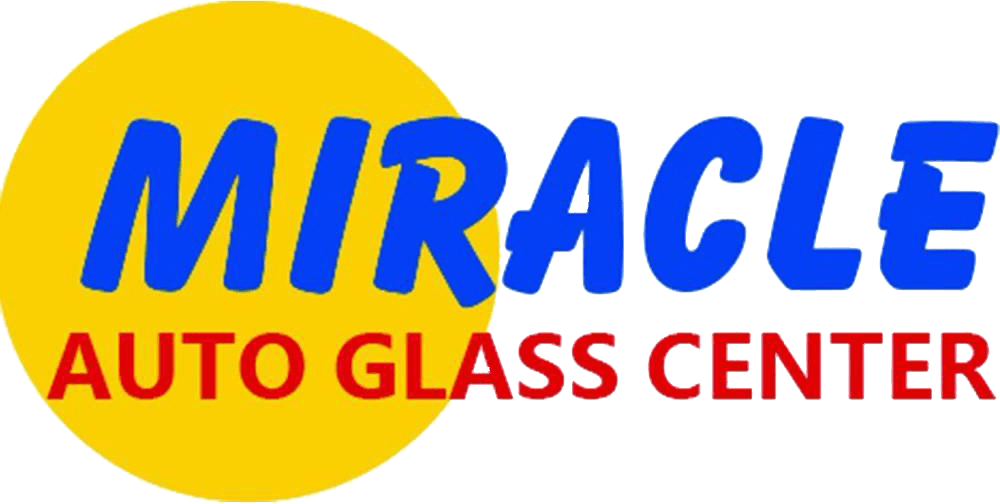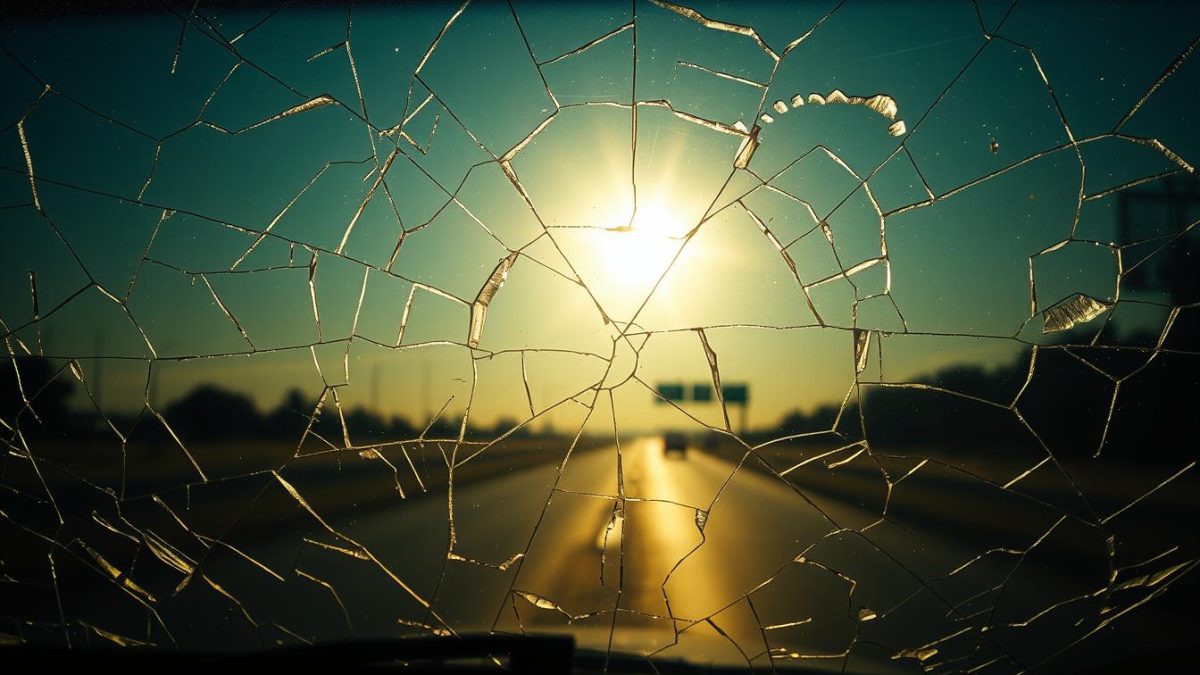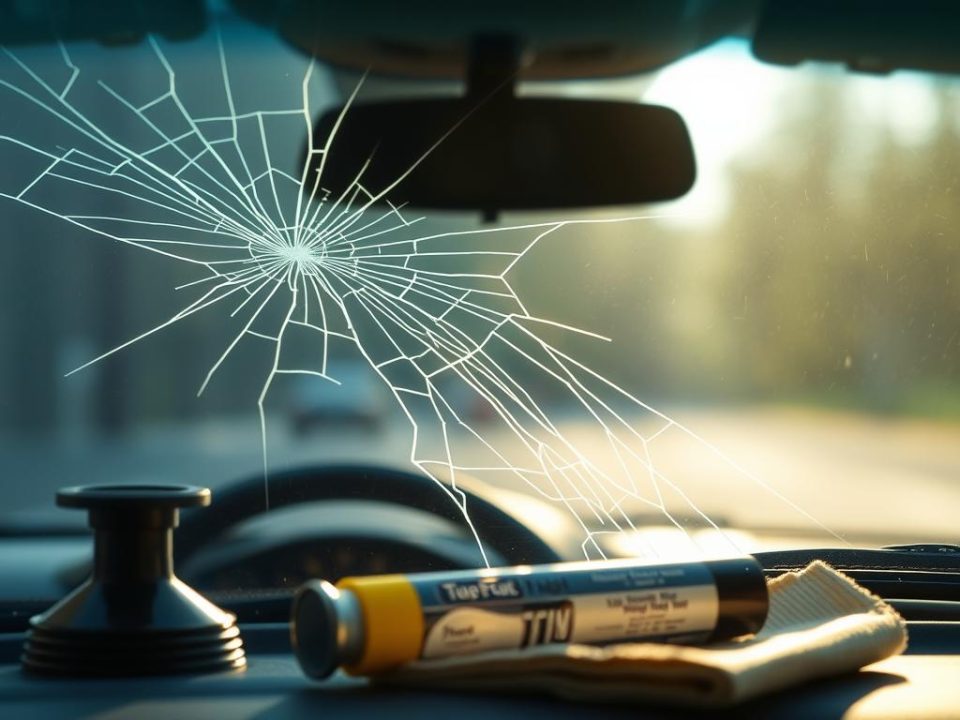
Why Your Windshield Might Be Making Whistling Noises

How Cold Weather Affects Your Auto Glass in San Antonio
Driving in Texas comes with its own set of rules and regulations, particularly when it comes to windshield damage. While the state doesn’t mandate vehicles to have windshields, having one means you must adhere to specific safety standards. Ignoring these regulations can lead to fines, safety hazards, and failed vehicle inspections.
Understanding the implications of driving with damaged windshields is crucial for maintaining road safety and complying with state regulations. Companies like Miracle Auto Glass provide professional windshield repair and replacement services to help drivers stay compliant and safe on the road.
Key Takeaways
- Texas regulations govern windshield damage to ensure safety and compliance.
- Driving with damaged windshields can lead to fines and safety hazards.
- Understanding the legal implications of windshield damage is crucial.
- Proper maintenance of vehicle glass components is essential for safety and compliance.
- Professional services like those offered by Miracle Auto Glass can help drivers maintain legal compliance.
Understanding Texas Auto Glass Law
Understanding Texas auto glass laws is crucial for drivers to avoid fines and ensure their vehicle is roadworthy. Unlike some states with strict regulations, Texas does not explicitly prohibit driving with windshield cracks. However, this doesn’t mean you’re completely in the clear.
Certain conditions could lead to fines, failed inspections, or even a traffic stop by law enforcement. Texas auto glass laws are primarily focused on ensuring driver visibility and road safety rather than mandating specific conditions for windshields.
Overview of Windshield Regulations in Texas
Texas regulations regarding windshields are designed to balance safety concerns with practical considerations for vehicle owners. The Texas Transportation Code doesn’t specifically mention cracked windshields, but it does prohibit driving with obstructed views that could impair safe operation of a vehicle.
- The state’s approach to windshield regulations allows for some flexibility while maintaining essential safety standards.
- Windshield damage that affects visibility or the structural integrity of the glass can lead to legal issues.
- Miracle Auto Glass technicians are well-versed in Texas auto laws and can help determine if your windshield damage requires attention.
By understanding these nuances, drivers can determine when repairs or replacements are necessary to maintain legal compliance and ensure their vehicle remains safe to drive.
Cracked Windshield Laws in Texas
Understanding the laws regarding cracked windshields in Texas is crucial for drivers to avoid potential legal issues. In Texas, the legality of driving with a cracked windshield depends on the extent and location of the damage.
Is It Illegal to Drive with a Cracked Windshield?
Technically, driving with a cracked windshield in Texas is not explicitly illegal, but there are caveats. The critical factor is whether the crack obstructs the driver’s view or compromises the windshield’s structural integrity. Law enforcement officers have the discretion to issue citations if they deem the damage a safety hazard.
For instance, cracks that distort the windshield’s shape or extend into the area swept by the wipers can be considered a violation. Miracle Auto Glass recommends addressing even minor cracks promptly to prevent them from becoming a more serious legal and safety issue.
When Windshield Damage Becomes a Legal Issue
Windshield damage becomes a legal issue when it directly impacts the driver’s ability to see the road clearly. Factors such as the size, location, and severity of the crack are considered when determining if a violation has occurred.
Multiple small cracks or chips can collectively constitute an obstruction to vision. Environmental factors like temperature changes and road vibrations can cause cracks to spread, potentially creating a legal issue. Thus, understanding when windshield damage crosses the line from a cosmetic issue to a legal violation is essential for Texas drivers.
Visibility Requirements Under Texas Law
Texas law mandates that drivers maintain an unobstructed view of the road at all times. This requirement is fundamental to ensuring road safety and preventing accidents. The law doesn’t specify exact measurements for what constitutes an obstruction, giving law enforcement officers the discretion to determine if a crack, chip, or other damage impairs visibility.
What Constitutes an Obstructed View
An obstructed view occurs when any damage or foreign object on the windshield interferes with the driver’s line of sight. Common obstructions include cracks or chips in the driver’s direct line of sight, improperly placed GPS devices, and excessive window tinting. The critical area for visibility is generally considered to be the portion of the windshield swept by the wipers, particularly on the driver’s side.
- Cracks or chips directly in the driver’s line of sight can be considered obstructions.
- Improperly placed accessories like GPS devices or hanging decorations can also obstruct the view.
- Excessive dirt, debris, or fogging that prevents clear sight through the windshield is another common obstruction.
Common Windshield Obstructions to Avoid
To comply with Texas law and ensure safety, drivers should be aware of common windshield obstructions. Miracle Auto Glass technicians are trained to identify such obstructions and recommend appropriate repairs or replacements. Some of the most common issues include:
- Non-transparent items affixed to the windshield, such as certain stickers or decorations.
- Obstructions that distort or refract light, like certain types of cracks or improperly applied aftermarket films.
- Even small cracks or chips can be problematic if they’re directly in the driver’s line of sight or create glare.
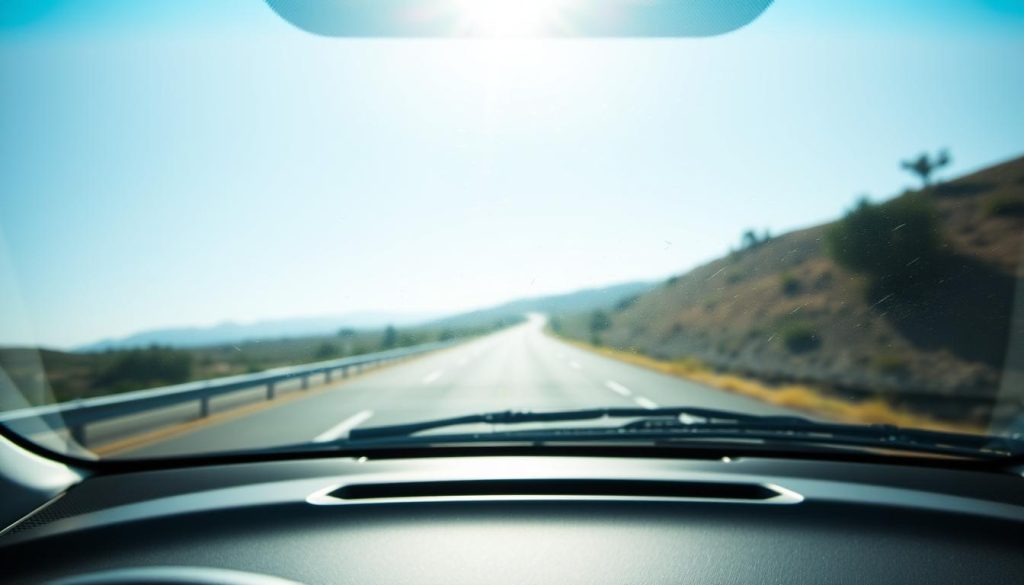
Maintaining proper visibility isn’t just about legal compliance; it’s a critical safety measure that helps prevent accidents on Texas roads. By understanding what constitutes an obstructed view and taking steps to avoid common windshield obstructions, drivers can ensure a safer driving experience.
Windshield Sticker and Label Regulations
Understanding the regulations surrounding windshield stickers and labels is crucial for Texas drivers to avoid fines and ensure their vehicle’s compliance with state laws. Texas has enacted specific rules to govern the placement of these stickers, aiming to prevent obstructions to the driver’s view.
Legal Placement of Registration and Inspection Stickers
Registration and inspection stickers must be placed in designated areas on the windshield. According to Texas law, these stickers can be positioned in the lower left-hand corner of the windshield or directly behind the rear-view mirror on the passenger’s side. Proper placement is crucial to avoid traffic citations or inspection failures. Miracle Auto Glass ensures that all stickers are properly positioned during windshield replacement to help customers maintain legal compliance.
Prohibited Materials on Windshields
Texas law prohibits placing non-essential materials on windshields that could obstruct the driver’s visibility or create safety hazards. This includes decorative stickers, large parking permits, and advertising decals. Even transparent materials can be problematic if they distort vision or create glare. The law allows for certain essential stickers, such as vehicle registration, inspection certificates, and toll tags, provided they are properly positioned.
By understanding and adhering to these regulations, Texas drivers can avoid unnecessary citations and ensure their vehicle passes required state inspections. It’s also important to choose a reputable service provider like Miracle Auto Glass for windshield replacement, as they will ensure that all legally required stickers are properly transferred or replaced.
Texas Window Tinting Laws
Understanding Texas window tinting laws is crucial for drivers to avoid legal issues. Texas has established clear guidelines for the amount of tint allowed on various windows of a vehicle to balance privacy preferences with essential visibility and safety concerns.
Windshield Tinting Restrictions
For windshields, Texas law permits tinting only on the top five inches or above the manufacturer’s AS-1 line. The tint must allow at least 25% of light to pass through. Reflective or colored tints, such as red, amber, or blue, are strictly prohibited. Miracle Auto Glass offers legal window tinting services that comply with all Texas regulations.
- Texas law requires a minimum of 25% light transmission through the windshield tint.
- All window tinting in Texas must be certified with a label between the film and glass on the driver’s side window.
- Medical exemptions for darker window tints are available with proper documentation.
Side and Rear Window Tinting Requirements
Front side windows must allow at least 25% of light to pass through, ensuring visibility from outside the vehicle. Rear side windows and the rear windshield have more flexible tinting allowances, but vehicles with darkly tinted rear windows must have dual side mirrors. Reflective or mirrored tints cannot exceed 25% reflectivity.
- Front side windows must have a light transmittance of at least 25%.
- Vehicles with dark rear window tints must be equipped with dual side mirrors.
Vehicle Inspection Requirements for Windshields
To ensure road safety, Texas conducts annual vehicle inspections, with a specific emphasis on windshield condition. The Texas Department of Public Safety (DPS) sets strict standards for windshield integrity to guarantee driver visibility and vehicle structural integrity. During these inspections, officials evaluate the windshield for any cracks, chips, or damage that might obstruct the driver’s view or compromise the glass’s structural integrity.
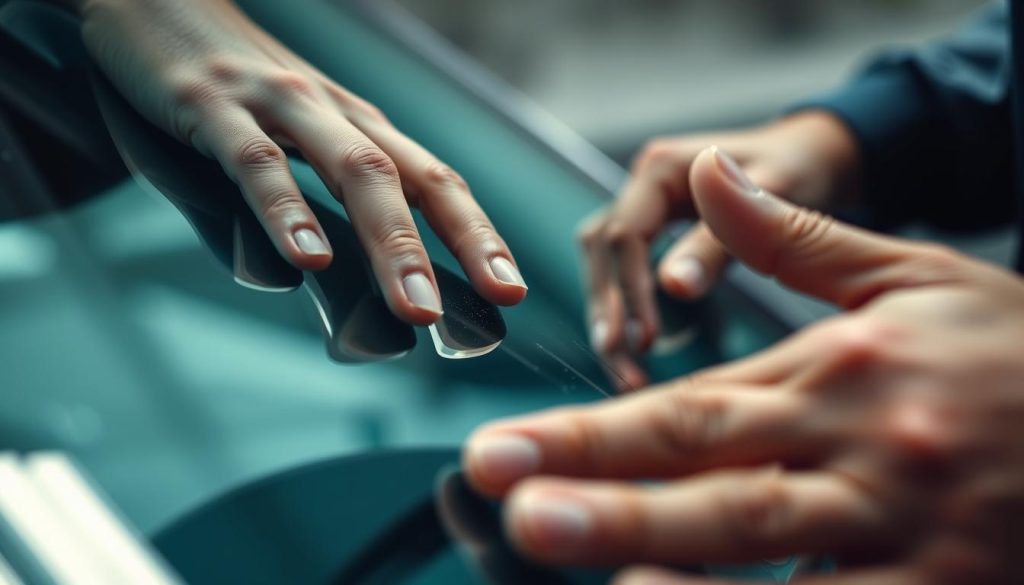
What Inspectors Look For in Windshield Condition
Inspectors specifically check the area swept by the windshield wipers, as damage in this critical visibility zone will result in automatic inspection failure. The functionality of windshield wipers and washer systems is also evaluated during inspections, as these components are essential for maintaining visibility in adverse weather conditions. Miracle Auto Glass provides pre-inspection assessments to identify potential windshield issues that might cause inspection failure, helping customers address problems proactively.
Common Reasons for Inspection Failure
Common reasons for windshield-related inspection failures include cracks in the driver’s line of sight, damage that affects the structural integrity of the glass, and improperly sealed windshields. Even small chips or cracks that have been improperly repaired can lead to inspection failure if they obstruct visibility or compromise the windshield’s integrity. Understanding these inspection requirements helps Texas drivers maintain their vehicles properly and avoid the inconvenience of failed inspections due to windshield issues.
Insurance Coverage for Windshield Damage in Texas
In Texas, understanding insurance coverage for windshield damage is crucial for drivers. Texas law allows drivers to repair or replace windshields as needed, but there are no mandates requiring insurance companies to cover such services unless specified in the policy.
Understanding Your Policy Coverage
Most comprehensive insurance policies cover windshield damage, but it’s essential to review the details of your policy to understand your coverage. Many Texas auto insurance policies include coverage for windshield damage under comprehensive coverage, though specific terms and deductibles vary between providers.
- Some policies offer full coverage for windshield repairs while others may require deductible payments for replacements.
- Insurance providers in Texas offer special “glass coverage” endorsements that provide enhanced protection for windshield damage with reduced or waived deductibles.
Filing a Claim for Windshield Repair or Replacement
Filing an insurance claim for windshield repair or replacement doesn’t have to be complicated. Contact your insurance provider about the damage as soon as possible and provide detailed information about the incident. Check if your policy includes comprehensive coverage and whether it applies to windshield damage.
- Miracle Auto Glass works directly with most major insurance companies to handle claims processing, minimizing paperwork and hassle for customers.
- Documentation of the damage through photos and detailed descriptions can help streamline the approval process.
Why Timely Windshield Repairs Matter
Timely windshield repairs are essential for maintaining vehicle safety and structural integrity. Delaying repairs or replacement can lead to increased damage, failed inspections, and safety risks.
A windshield with minor chips or cracks can quickly deteriorate due to temperature fluctuations, road vibrations, and normal driving stresses. Addressing these issues promptly is typically less expensive than waiting until a full replacement becomes necessary.
Modern windshields contribute significantly to a vehicle’s structural integrity, providing up to 45% of the cabin’s structural strength in a rollover accident. Moreover, a damaged windshield can compromise the effectiveness of airbag deployment systems.
Environmental factors in Texas, including extreme temperature variations and road conditions, can accelerate the progression of minor windshield damage into major structural issues. Properly functioning auto glass is essential for clear visibility during adverse weather conditions.
- Many windshield repairs can be completed in under an hour when addressed early.
- Advanced repair techniques used by Miracle Auto Glass can restore the structural integrity of windshields with minor damage.
- Waiting too long for repairs can allow dirt and moisture to penetrate cracks, making them impossible to repair effectively.
Don’t compromise your safety or risk legal issues—contact Miracle Auto Glass today for professional assessment and repair of any windshield damage before it worsens.
Conclusion
Texas drivers must be aware of the laws and regulations surrounding auto glass to avoid potential risks and fines. Understanding Texas auto glass laws is essential for every driver to ensure legal compliance, pass vehicle inspections, and maintain optimal safety on the road.
A cracked windshield can pose significant safety risks, including impaired visibility while driving and compromised structural integrity during accidents. It’s crucial to address any damages immediately to avoid fines, failed inspections, or safety risks.
Miracle Auto Glass specializes in all aspects of auto glass repair and replacement, with technicians who understand Texas regulations and can ensure your vehicle remains compliant. Our team provides fast, professional service for all types of auto glass damage, working with your insurance to minimize out-of-pocket expenses.
Don’t wait until minor windshield damage becomes a major safety hazard or legal issue—contact Miracle Auto Glass today to fix your windshield or other glass damage and drive with confidence knowing your vehicle is both safe and compliant with Texas law.
